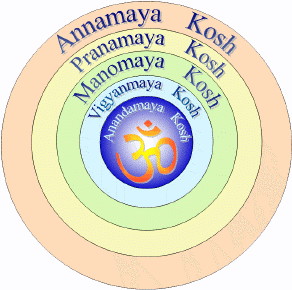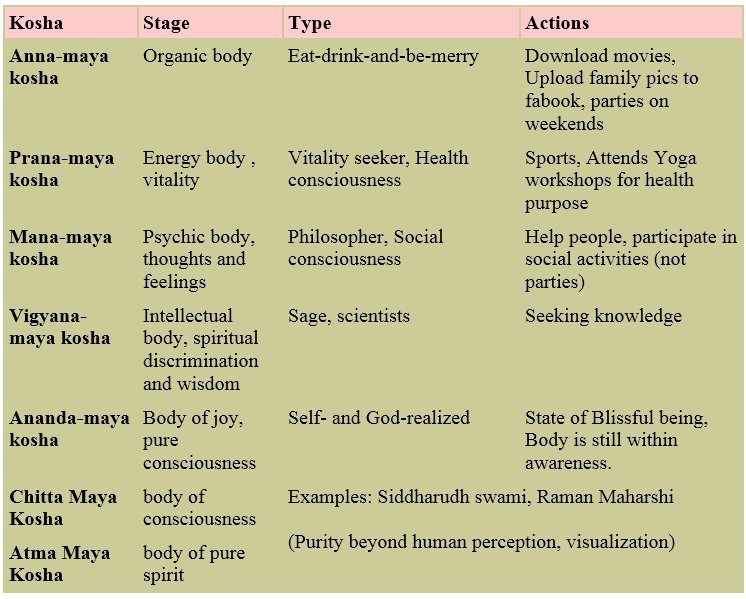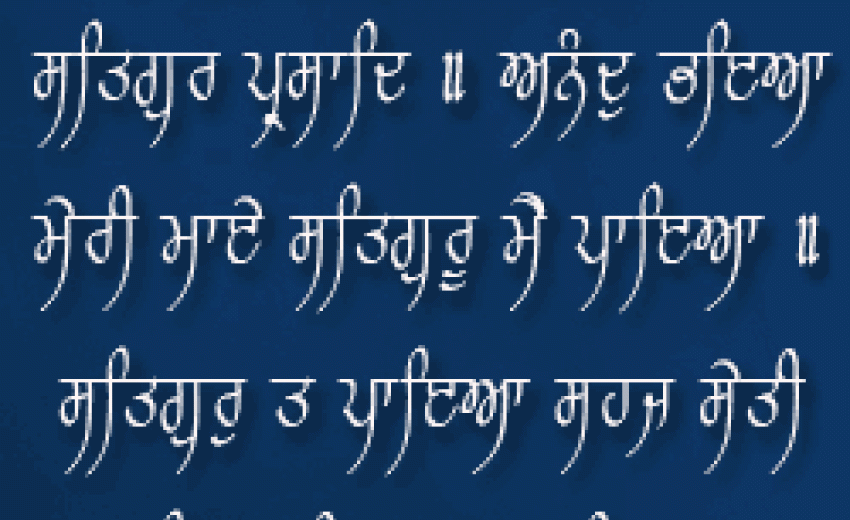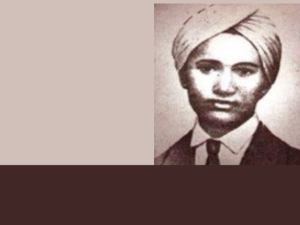Read Part I here
Does This World Bring Happiness?
The happiness we get in this life, in our day-to-day lives, is very elementary. It is only a shadow, and the real one is elsewhere. It is only a door, which leads us to misery and pain. This may appear pessimistic, but unfortunately it is a truth. What we call pleasure, happiness, etc in this world is only an introduction to the pain that will follow. So, if we seek happiness here, we must be ready to receive the pain that follows it. We are all in a vicious circle. There should be an end to moving about in this vicious circle. That end comes when we understand that this world is not everything. We must also understand that this world is a teacher, teaching us to get what is true and real. This world is a showroom, which gives us samples only. It says: 'This is only a sample. Now, seek the real inside.'
So the world, with all its glitter and shine, is only a showroom which stimulates sensations in our mind. And we think we are happy or sad. The Buddha, therefore, said that this world is misery, 'duhkha'.
Stages of Bliss
According to Hinduism, there are four stages of bliss i.e., Vishayānanda, Shamananda, Bhajanānanda and Brahmānanda. Vishay-ānanda is the bliss born of sensuality and is extremely ordinary; it is pain confused as bliss. Sham-ānanda is the bliss born of self-control. Controlling our passions is considered as bliss which in actuality is not. Bhajan-ānanda is the bliss born of spiritual practice. The name of God is extremely sweet. By repeating it, we will attain bliss. Initially it is not possible. But as we go forward, there will be immense bliss. Brahm-ānanda: The bliss born of supreme Attainment of Truth. There can be no comparison with this bliss since all illusion is removed, and we realise ourselves as beings of bliss.
Characteristics of Bliss
1. Bliss is an innate state of inner joy. It is constant, undisturbed by outward gain or loss. We all have the capacity for it, no matter our age, background, physical or mental disabilities, ethnicity, gender, or religion. External circumstances, whether positive or negative, happy or sad, do not affect it.
2. It is a state of unity, transcendence, completeness, knowingness, wholeness, and uplifted consciousness; it is a feeling of oneness and connection with all of creation. Bliss is never boring; it feels ever new, expansive, and infinite. When bliss appears, one instantly recognizes it as the most central of all truths. Bliss is the eternal, forever unchanging reality which permeates the universe.
3. Bliss is where happiness, meaning, and truth converge on everything. We pursue money or relationships because we think they will make us happy. We pursue our vocation, our hobbies, and our life's passions because we feel they are deeply meaningful to us. We explore science, religion and philosophical inquiry because we want to know the truth of our existence. Bliss is the universal place that these intersect, where all questions are answered, where every fulfillment is attained.
4. Bliss is found in every religion but does not require a specific religion in order to know it. Bliss is the ultimate state of consciousness that every religion holds as its highest goal and achievement, though each uses different terminology to explain it. Whether we are Christian or Hindu, Jewish or Muslim, Buddhist or atheist, Wiccan or animist, Taoist or Native American, we all strive for bliss.
5. Bliss is like white light. Just as pure light is the totality of all color, bliss is the conglomeration of all positive qualities. When seen through the prism of spiritual awareness the subcomponents of bliss are joy, unconditional love, inner peace, power, connectedness, awe, and wisdom. Bliss cannot even be attained, really. The soul simply realizes that bliss simply is. It is what remains after everything external and fleeting disappears.
6. Bliss through serving others: Swami Vivekananda says: 'In this little life of ours, if we can bring even a moment's joy in another heart that alone is true religion. Everything else is moonshine. This I have learnt suffering all my life.' Bring joy to others, and you shall attain joy. Because spiritually no one is different from the other since all are the creation of same God. We all are one and the same. To bring joy to others, we must serve them. This is one of the best ways of being in bliss.
Bliss (Anand) in Spritual context
The word "bliss" is a very soothing and joyful word. Spiritually speaking, bliss is like dwelling in paradise (swarg sukh) if there is any; or attaining nirvana - a place free from pain, worry, and suffering, if there is any. In spiritual context anand is an eternal aspect of Brahm (God) which we experience when we are united with Him. In scriptures even God itself is described as anand. The spiritual bliss is attained when we know the Truth or God as ánand or supreme bliss. Sukh also is bliss but it is the joy experienced in ordinary life. In the material world anand is pure joy attained through the fulfillment of desires or some material gains. In the spiritual world it is the true and unqualified bliss attained through union with the Highest Self. When there is no distinction between the knower and the knowing, the object and the subject, one becomes immersed in immense bliss.
When the need or desire for happiness is absent, happiness manifests itself. Dependence upon happiness becomes an integral part of one's consciousness. This is the secret of happiness or bliss the one who truly meditates; understands. Therefore it cultivates detachment and strives for one's liberation. Bliss comes naturally to their minds.4 Chanting and meditating on the Naam, mind becomes blissful5. Quieting the ego, ecstasy is obtained. Where the ego does not exist, God Himself is there.6
If we contemplate ecstasy, it may bring to mind an orgasmic state, or the high that comes when a person wins the Olympics, or other such euphoric moments. The opposite of ecstasy, agony, is also a momentary state. Both of these extremes cannot last, like waves, which arise and then melt back into the ocean from where they came. Bliss is a state of being, which is unbounded by time. It is eternally present, breathing through all of life. When we are identified with the waves, we are unaware of the ever-present reality of oceanic bliss. The quality of bliss cannot be touched by momentary events or changes. It is our undercurrent; a space we return to again and again whenever present moment awareness is awakened within.
Bliss in Indian religions:
Hinduism, Jainism and Buddhism relate suffering with bliss and recognize suffering as an inseparable aspect of human life. However each religion attempts to address suffering and bliss in their own way by suggesting distinct solutions. The goal of all these religions however is always the same, relief from the cycle of births and deaths, disease, attachment and suffering. Buddhism does not describe the state of liberation as pure bliss. But Jainism and Hinduism do. According to them the natural state of soul is pure bliss which becomes veiled by the activity of the senses and the development of a physical personality. Bhagavad Gita (5.21) says: 'He, who is unattached to the external world and its objects, and is attached to the inner Self, will attain supreme happiness (bliss), which is everlasting.' Supreme happiness, bliss or anand is the goal of all beings. All are seeking that goal only-some ignorantly, some with knowledge. Therefore, according to all the different philosophies of Hinduism-Yoga, Vedanta, Sankhya, dualists, non-dualists-their goal is to transcend dualities like happiness and misery and reach the state of supreme Bliss. It is in that state that we get real bliss. Until then, individuals are only passing through different states of mind. We may restate the ideas in the form two simple laws (1) seek what is true and lasting; (2) the more you seek what is true and lasting, the more you go nearer to the source of supreme, everlasting Bliss, which is within you.
When the soul regains its pure state of joy it overcomes its limitations and becomes one with itself or with the highest Brahm. This is why the Hindu scriptures describe God as a combination of sat (truth) chit (consciousness) and anand (pure bliss). In their ordinary consciousness human beings are incapable of experiencing pure anand because of the interference of the mind and the senses and the attachment of the ego with the sense objects bliss. Mind and body have to be controlled and tuned to the God. A favourable experience is achieved through spiritual practice (jivatma), the God realised soul (Shivatma) or the soul in the state of union with The Supreme God (Shivadasa), when the functions of the five senses, mind and intellect have ceased. When the mind does not get disturbed even by intense sorrow and remains Blissful, it is the Bliss of Self-realisation (Atmanand)7. After acquisition of this happiness, one does not desire to obtain any other type of happiness. This is known as the Bliss of Self-realisation (Atmanand).8
According to Buddha, everything is duhkha, misery. Birth is misery, living is misery, death is misery, world is misery. Secondly, everything is momentary, kshanika. When one attains Nirbana or liberation according to Buddhism, one becomes extinct. Nirbana means to become extinct, and to end our misery. But there is no permanent entity according to Buddhism. Everything is a samgháta, coming together, and everything will disintegrate in Nirbana. All the schools of Hinduism, on the other hand, say that life is not merely duhkha. The external world brings sorrow according to various schools of Hinduism but according to the Vedas, the sources of Hinduism, life is ánanda, bliss. The Vedas say: 'From bliss did things come into being. In bliss do they exist, and to bliss do they return finally.' Everything is bliss. There is a wonderful mantra in the Vedas: 'The air is filled with sweetness of ambrosia, the oceans are filled with sweetness, the plants and trees are filled with sweetness, and everything is filled with sweetness of ambrosia.' So, according to Hinduism, everything is bliss and not sorrow. Now, how to reconcile the Buddha's ideas and the ideas of the Vedas? The Buddha was speaking about the world as it is now, and the Vedas speak of the ideal we are to attain. In the ordinary sense, in the world we are living in, it is all misery. It appears to be glittering and shining. We appear to be in a paradise. But we see that we are chasing a mirage here. Ask those who are 70 or 80 years old if they are happy. They will not say from their heart that they are happy. Nobody is happy. In spite of all our dancing, drinking, and enjoying the world, ultimately we see that nothing has been achieved. That is what Buddha also said. In order to overcome sorrow and suffering, and enjoy everlasting bliss, we must look elsewhere. Here comes the teaching of the Vedas. Hinduism firmly asserts that there is something permanent behind this entire changing world. There is something permanent behind the changing us. Our bodies keep on changing, our minds keep on changing, but behind and beyond these two, there is something shining. That is the eternal Principle, the Atman. Bliss is the basic nature, the very core of the embodied soul and the universe. Hence the embodied soul has an inherent tendency to return to its basic nature, that is to experience Bliss and on attaining it, tries to sustain it.
 Paramhansa Yogananda, explained that bliss is, "a transcendental state of superior calm including within itself the consciousness of a great expansion and that of 'all in One and One in all.'" When that sense of ego, of separation, melts away, a feeling of total connectedness, of no sense of a "me" separate from all of creation descends, that is bliss consciousness.
Paramhansa Yogananda, explained that bliss is, "a transcendental state of superior calm including within itself the consciousness of a great expansion and that of 'all in One and One in all.'" When that sense of ego, of separation, melts away, a feeling of total connectedness, of no sense of a "me" separate from all of creation descends, that is bliss consciousness.
According to Hindu scriptures a being has three types of body i.e., Gross, Astral and Causal body and inside the body the Soul is wrapped inside five (or seven more precisely) layers (Pancha kosha) of Arishadvarga.
These koshas are Annamay Kosh (Food Sheath) - Outermost of the Pancha koshas; Pranmay Kosh (Vital Air Sheath); Manomay Kosh (mind as distinctly different from intelligence - Sheath); Vigyanmay Kosh (Intellect Sheath); Aanandmay Kosh (Bliss Sheath - or ceaseless joy not connected with body or mind); Chitta Kosh (spiritual wisdom); Sat Kosh (the final state of merging with the Infinite) . The various kosh, their stage, characteristics and actions are shown in the chart below

Meditate upon the Knowledge and Bliss Eternal, and you will also have bliss. The Bliss indeed is eternal, only it is covered and obscured by ignorance. The less your attachment is towards the senses, the more will be your love towards God."Experience the bliss of the instant. Enjoy the celebration of life and manifestation. The process of manifestation itself is absolute bliss. You feel life flowing through your whole being.10
Why Bliss?
Life is full of problems, crisis and disruptions. One feels unable to relax and fully enjoy life in the daily course of business and sense of preoccupation. Due to this, one gets disconnected from healthy energy, nature, and love. One gets fearfulness and worried about the future; feels alone, unloved, and disconnected from others. One feels the need to satisfy the ego through power, material wealth, or control, thereby gets out-of-touch with one's real self and creating false personae. Nearly everyone experiences these disconnects from spiritual bliss. It is nearly impossible to escape bumping into them given society's focus on wealth, power, and materialism. But how deeply and how long one becomes entrenched is within one's control. It is possible to live in this world but not totally of it. Sometimes it takes living an ego-focused life (i.e., a life filled with "the trappings of the material or linear world") before we fully embrace our longing for spiritual bliss and before we discover we can't achieve it through the ego.
Bliss provides a connection to healthy, light energy; helps living effortlessly, in the flow, without resistance; creates a sense of connection to something larger, to nature, to the world; and feelings of love and gratitude for self and those around; engages one fully in the present without fear or worry for the future or past and creates an ease in relationships.
The goal of life is to know God. We are born again and suffer again and again, only because we don't know God or Truth. We are not here in this world to enjoy it and suffer. We are here to know God. Why should we know God? We should know God for the simple reason that we are part of God. We are Divine. To know God, we must practice self-control, and perform spiritual practices. When we are in the world, seeking worldly joys, we get very limited bliss, but extreme pain. When we seek God, we get immense peace and bliss, which is our true nature. We need not beg or borrow it. It is our real nature. Since we think we are limited, we are suffering. When we give up limitations, we know the Bliss.
Click here to continue to part III
===============
References
[1] The American Heritage® Dictionary of the English Language, Fourth Edition copyright ©2000 by Houghton Mifflin Company. Updated in 2009. Published by Houghton Mifflin Company.
[2] Collins English Dictionary – Complete and Unabridged © HarperCollins Publishers 1991, 1994, 1998, 2000, 2003
[3]http://www.gatewayforindia.com/articles/happiness.htm
[4] ਜਾ ਕੈਸਹਜਿ ਮਨਿ ਭਇਆ ਅਨੰਦu ॥ਮਃ 5, ਪੰਨਾ 237, ਸਤਰ 1
[5] ਜਪਿ ਜਪਿ ਨਾਮੁ ਮਨਿ ਭਇਆ ਅਨੰdw॥ ਮਃ 4, ਪੰਨਾ 367, ਸਤਰ 2
[6] ਹਉ ਛੁਟਕੈ ਹੋਇ ਅਨੰਦu ਤਿਹ ਹਉ ਨਾਹੀ ਤਹ ਆਪਿ ॥ ਮਃ 5, ਪੰਨਾ 260, ਸਤਰ 18
[7] यास्मिन् स्थितो न दु:खेन गुरुणापि अविचाल्यते ।
[8] सुखं आत्यंतिकं यत् तत् बुद्धिग्राह्यं अतींद्रियं
[9]http://ubudashram.org/bali-meditation-centre/ubud-inn/anandam-the-story-...
[10]http://media.radiosai.org/journals/Vol_04/01SEP06/veda_musings_understan...
[11] ਮਿਲਿ ਪ੍ਰੀਤਮਜਿਉ ਹੋਤ ਅਨੰਦwਤਿਉ ਹਰਿ ਰੰਗਿ ਮਨੁਰੰਗੀਨਾ ਜੀਉ ॥੩॥ ਮਃ 5, ਪੰਨਾ 100, ਸਤਰ 16
[12] ਸਦਾ ਅਨੰਦੁ ਜਾ ਹਰਿਗੁਣ ਗਾਮੁ ॥੨॥ ਮਃ 5, ਪੰਨਾ 186, ਸਤਰ 6
[13] ਮਨ ਰੇਸਦਾ ਅਨੰਦੁਗੁਣ ਗਾਇ ॥ ਮਃ 3, ਪੰਨਾ 36, ਸਤਰ 12.
[14]ਸਦਾ ਅਨੰਦਿਰਹੈ ਦਿਨ ਰਾਤੀਅਨਦਿਨੁ ਰਹੈ ਲਿਵਲਾਈ ॥ ਮਃ 3, ਪੰਨਾ 245, ਸਤਰ 15
[15]ਸਹਜੁ ਅਨੰਦu ਸਦਾ ਗੁਰਮਤੀਹਰਿ ਹਰਿ ਮਨਿਧਿਆਇਆ ॥ ਮਃ 3, ਪੰਨਾ 163, ਸਤਰ 14
[16] ਸਦਾ ਅਨੰiਦ ਰਹੈਦਿਨੁ ਰਾਤੀ ਮਿਲਿ ਪ੍ਰੀਤਮਸੁਖੁ ਪਾਏ ॥੩॥ ਮਃ 3, ਪੰਨਾ 31, ਸਤਰ 6
[17] Kaur, Gurwinder (May 2007). "The Theme and Significance of ‘Anand’ Bani".The Sikh Review.
[18] Cole, William (1990). A Popular Dictionary of Sikhism. The University of Michigan: Curzon. p. 18.
[19]Neki, J. "Anand Saheb".thesikhencyclopedia.com. Retrieved 15 March 2013.
Khokhar, Kulwant (2003). Nit-Nem Daily Prayer. Virginia, USA.: Dr. Baljit Singh Sidhu-Dr. Jatindar Kaur Sidhu. p. 11.
[20]http://www.thesikhencyclopedia.com/sri-guru-granth-sahib-and-guru-gobind... sahebhttp://www.globalsikhstudies.net/pdf/Nitnem%20by%20Dr.%20Kulwant%20Singh...
[21] Kaur, Gurwinder (May 2007), "The Theme and Significance of ‘Anand’ Bani". The Sikh Review.
[22] Macauliffe, Max (1909). The Sikh Religion, Vol. II. Clarendon Press Oxford. p. 130.
[23] "Anand Sahib".srigurugranthsahib.org. Retrieved 15 March 2013.
[24] Kaur, Gurwinder (May 2007). "The Theme and Significance of ‘Anand’ Bani". The Sikh Review.
[25] ਸਦਾ ਅਨੰਦu ਹਰਿ ਨਾਮਿਲਿਵ ਲਾਈ ॥੬॥ ਮਃ 3, ਪੰਨਾ 233, ਸਤਰ 8
[26] ਵਡੈ ਭਾਗਿਸਤਸੰਗਤਿ ਪਾਈ ਹਰਿ ਪਾਇਆਸਹਜਿ ਅਨੰਦੁ॥੨॥ ਮਃ 3, ਪੰਨਾ 29, ਸਤਰ 14
[27]ਹਰਿ ਸੰਤ ਜਨਾ ਮਿਲਿ ਕਾਰਜੁ ਸੋਹਿਆ ਵਰੁ ਪਾਇਆ ਪੁਰਖੁ ਅਨੰiਦ ॥ ਮਃ 4, ਪੰਨਾ 78, ਸਤਰ 17
[28] ਸਦਾ ਅਨੰiਦ ਰਹੈਸੁਖਦਾਤਾ ਗੁਰਮਤਿ ਸਹਜਿ ਸਮਾਵਣਿਆ॥੨॥ ਮਃ 3, ਪੰਨਾ 126, ਸਤਰ 6
[29] ਮਿਲਿਆ ਲਾਹਾਭਏ ਅਨੰਦ ॥ਮਃ 5, ਪੰਨਾ 372, ਸਤਰ 5
[30] सुखार्था: सर्वभूतानां मता: सर्वा: प्रवृत्तय: ।- Ashtanghruday by Vagbhat, Sutrasthan 2:19
सुखं न विना धर्मात् तस्मात् धर्मपरो भवेत् ।- वाग्भटकृत अष्टांगहृदय, सूत्रस्थान २:१९
[31]pRQmy iqAwgI haumY pRIiq ] duqIAw iqAwgI logw rIiq ] qRY gux iqAwig durjn mIq smwny ] qurIAw guxu imil swD pCwny ] 2 ] shj guPw mih Awsxu bwiDAw ] joiq srUp Anwhdu vwijAw ] mhw Anµdu gur sbdu vIcwir ] ipRA isau rwqI Dn sohwgix nwir ] 3 ] jn nwnku boly bRhm bIcwru ] jo suxy kmwvY su auqrY pwir ] jnim n mrY n AwvY n jwie ] hir syqI Ehu rhY smwie ] 4 ] 2 ] (pMnw 370)
[32] ਸਿਫਤਿ ਸਲਾਹਣੁ ਸਹਜ ਅਨੰਦ ॥ ਮਃ 1, ਪੰਨਾ 352, ਸਤਰ 3
[33] ਸਦਾ ਅਨੰਦu ਹਰਿ ਨਾਮਿ ਲਿਵ ਲਾਈ ॥੬॥ਮਃ 3, ਪੰਨਾ 233, ਸਤਰ 8
[34] ਸਦਾ ਅਨੰਦੁ ਜਾ ਹਰਿਗੁਣ ਗਾਮੁ ॥੨॥ ਮਃ 5, ਪੰਨਾ 186, ਸਤਰ 6
[35]ਤਿਨਾ ਅਨੰਦuਸਦਾ ਸੁਖੁ ਹੈਜਿਨਾ ਸਚੁ ਨਾਮੁਆਧਾਰੁ ॥ ਮਃ 3]
[36]ਮਹਾ ਅਨੰਦ ਅਚਿੰਤ ਸਹਜਾਇਆ॥ ਮਃ 5, ਪੰਨਾ 371, ਸਤਰ 14
[37] ਕਹੈ ਨਾਨਕੁਏਹੁ ਅਨੰਦuਹੈ ਆਨੰਦੁ ਗੁਰ ਤੇਜਾਣਿਆ ॥੭॥ ਮਃ 3, ਪੰਨਾ 917, ਸਤਰ 18
[38] ਮਹਾ ਅਨੰਦu ਗੁਰ ਸਬਦੁ ਵੀਚਾਰਿ ॥ ਮਃ 5, ਪੰਨਾ 370, ਸਤਰ 16
[39] ਸਬਦਿ ਮਰੈ ਤਿਸੁ ਸਦਾ ਅਨੰਦ ॥ ਮਃ 3, ਪੰਨਾ 364, ਸਤਰ 6
[40] ਹਉ ਛੁਟਕੈਹੋਇ ਅਨੰਦuਤਿਹ ਹਉ ਨਾਹੀ ਤਹਆਪਿ ॥ ਮਃ 5, ਪੰਨਾ 260, ਸਤਰ 18
[41] ਸਦਾ ਅਨੰਦu ਨਿਹਚਲੁ ਸਚੁ ਥਾਨਾ ॥ ਮਃ 5, ਪੰਨਾ 237, ਸਤਰ 14
[42] ਸਾਧਸੰਗਿ ਮਿਲਿ ਕਰਹੁ ਅਨੰਦ ॥ ਮਃ 5, ਪੰਨਾ 293, ਸਤਰ 1
[43] ਸਦਾ ਅਨੰiਦ ਰਹੈ ਦਿਨੁ ਰਾਤੀ ਜਨ ਨਾਨਕ ਅਨਦਿਨੁ ਹਰਿ ਗੁਣ ਗਾਵੈ ॥੧॥ਮਃ 4, ਪੰਨਾ 305, ਸਤਰ 16
[44]http://www.livingwithselfawareness.com
[45]http://www.jonathanrwachtel.co
[46]ਸਹਜ ਅਨੰਦ ਗਾਵਹਿ ਗੁਣਗੋਵਿੰਦ ਪ੍ਰਭ ਨਾਨਕਸਰਬ ਸਮਾਹਿਆ ਜੀਉ॥੪॥੩੬॥੪੩॥ਪੰਨਾ 107, ਸਤਰ 5
[47] ਸਦਾ ਅਨੰiਦ ਰਹਹਿਭਗਤਿ ਕਰਹਿ ਦਿਨੁ ਰਾਤੀਸੁਣਿ ਗੋਬਿਦ ਗੁਣ ਗਾਵਣਿਆ॥੨॥ ਮਃ 3, ਪੰਨਾ 121, ਸਤਰ 17
[48] ਸਦਾ ਅਨੰiਦ ਰਹੈਦਿਨੁ ਰਾਤੀ ਗੁਰਮੁਖਿ ਸਬਦੁਕਰਾਵਣਿਆ ॥੫॥ ਮਃ 3, ਪੰਨਾ 125, ਸਤਰ 5
[49] ਚੇਤਿ ਗੋਵਿੰਦੁਅਰਾਧੀਐ ਹੋਵੈ ਅਨੰਦuਘਣਾ ॥ ਮਃ 5, ਪੰਨਾ 133, ਸਤਰ 11
[50] ਫਲਗੁਣਿ ਅਨੰਦ ਉਪਾਰਜਨਾ ਹਰਿਸਜਣ ਪ੍ਰਗਟੇ ਆਇ ॥ ਮਃ 5 ਪੰਨਾ 136, ਸਤਰ 4
[51] ਤਿਥੈ ਨਾਦਬਿਨੋਦ ਕੋਡ ਅਨੰਦu॥ ਮਃ 1, ਪੰਨਾ 7, ਸਤਰ 19
[52] ਹਰਿ ਭਗਤਾਨੋ ਦੇਇ ਅਨੰਦੁ ਥਿਰੁ ਘiਰ ਬਹਾਲਿਅਨੁ ॥ ਮਃ 4, ਪੰਨਾ 91, ਸਤਰ 1
[53]ਗੁਰਮੁਖਿ ਕਰਮ ਕਮਾਵੈਬਿਗਸੈ ਹਰਿ ਬੈਰਾਗੁਅਨੰਦu॥ ਮਃ 3, ਪੰਨਾ 29, ਸਤਰ 13
[54] ਜਿਸੁ ਮਿਲਿਐਮਨਿ ਹੋਇ ਅਨੰਦੁ ਸੋ ਸਤਿਗੁਰੁਕਹੀਐ ॥ ਮਃ 4, ਪੰਨਾ 168, ਸਤਰ 11
[55] ਨਾਮੁਜਪਤ ਮਨਿ ਭਏਅਨੰਦ ॥ ਮਃ 5, ਪੰਨਾ 201, ਸਤਰ 17
[56] ਕਰਹਿ ਅਨੰਦu ਸਚਾ ਮਨਿਸੋਇ ॥ ਮਃ 1, ਪੰਨਾ 8, ਸਤਰ 5 ਸਬਦਿਅਨੰਦਕਰੇਸਦਕੇਲਾ॥ ਮਃ 5, ਪੰਨਾ 97, ਸਤਰ 10





